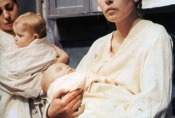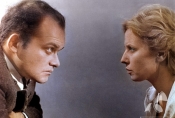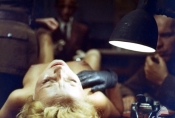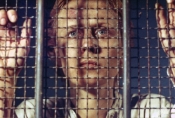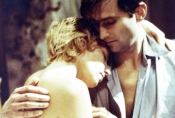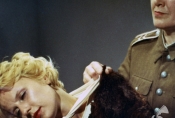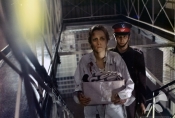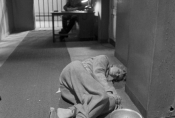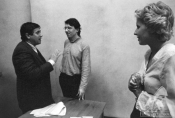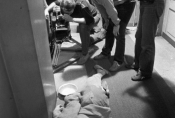INTERROGATION [1982]
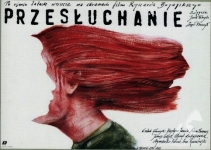
year:
- 1982
release date:
- 13 XII 1989
runtime:
- 111 min
directed by:
- Ryszard Bugajski
written by:
- Ryszard Bugajski
director of photography:
- Jacek Petrycki
cast:
- Krystyna Janda [Antonina Dziwisz], Adam Ferency [Tadeusz Morawski], Janusz Gajos [major Kąpielowy], Agnieszka Holland [Witkowska], Anna Romantowska [Mira Szajnert], Bożena Dykiel [Honorata, a peasant woman], Olgierd Łukaszewicz [Konstanty, Antonina’s husband], Tomasz Dedek [Czesiek, a Security Service officer who arrests Antonina], Jan Jurewicz [a warden], Jarosław Kopaczewski [a Security Service officer who arrests Antonina] ]
edited by:
- Katarzyna Maciejko
production design:
- Janusz Sosnowski
produced by:
- Zespół Filmowy „X
executive producer:
- Tadeusz Drewno
Konsultacja muzyczna :
- Agnieszka Hundziak
awards:
-
• Don Quixote 1989
• Lubusz Film Summer Łagów 1989 Grand Prix Golden Grape
• Polish Feature Film Festival Gdynia 1989: the Polish Cultural Foundation Award for Krystyna Janda, Journalist Award, Audience Award
• Golden Duck 1990
• IFF Cannes (France) 1990 Jury Prize for Best Actress for Krystyna Janda
• Polish Feature Film Festival Gdynia 1990: Special Jury Prize, award for the best female performance in a leading role for Krystyna Janda, award for the best male performance in a leading role for Janusz Gajos, award for best female performance in a supporting role for Anna Romantowska
• IFF Chicago (USA) 1990: Silver Hugo
• BESEF Belgrade (Yugoslavia) 1991: award for the best female performance for Krystyna Janda, FIPRESC Award
About the film
Bugajski’s film was deemed by the authorities at the time to be the most anti-communist film in the history of the People's Republic. It became the direct reason for dissolving Andrzej Wajda’s production company, Zespół X. An outstanding performance by Krystyna Janda.
The early 1950s. Antonina Dziwisz is a young attractive singer and a happy wife. She travels the country with a troupe of other artists and performs before audiences of workers and peasants. During one of the concerts, right after an argument with her husband, she is forced to drink alcohol by two individuals. She wakes up in a prison. She is questioned by Major Kąpielowy, who scrutinises her sex life in great detail. He also accuses her of illegal currency trading. She refuses to sign the statement. Lieutenant Morawski takes over as the interrogator.
Antonina is sitting in a cell with Mira Szajnert, a peasant woman named Honorata, and Witkowska, a staunch communist. During subsequent interrogations, the captors demand that the girl gives incriminating testimony against Major Olcha − accused of treason. Witkowska urges Antonina to confess as the people's government cannot be wrong. Cruel physical and mental torture nearly breaks the girl. But she continues to fight. Even flooding the detention cell to the ceiling with water, nor mock execution fails to bring her down. During the confrontation, Mira Szajnert confirms the testimony, accusing Tonia of co-operation with foreign intelligence. Officers of the Security Services show Konstanty a statement in which his wife has confessed to treason.
In a conversation with Antonina, her husband announces the divorce. The girl attempts suicide, biting her wrists. She spends Christmas Eve in hospital. She is visited by Morawski who wishes her happy Christmas. This leads to them making love. Sometime later, Antonina confesses to the investigating officer that she is pregnant with his child, and promises to keep the secret of who the father is. Morawski brings news that Olcha was shot. Antonina gives birth to a daughter but prison authorities take the child away from the mother. Stalin dies. Morawski tells Antonina that she will soon be free. After her departure from the room, he commits suicide. Antonina Dziwisz is released from jail and returns home along with her daughter.
My film is a manifesto of a man who wants to be free, regardless of the price he must pay. (Ryszard Bugajski)
Waldemar Piątek, Leksykon polskich filmów fabularnych, Warszawa 1996
